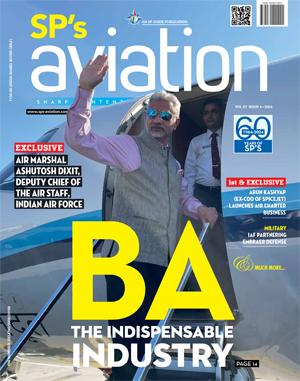INDIAN ARMED FORCES CHIEFS ON
OUR RELENTLESS AND FOCUSED PUBLISHING EFFORTS

SP Guide Publications puts forth a well compiled articulation of issues, pursuits and accomplishments of the Indian Army, over the years

I am confident that SP Guide Publications would continue to inform, inspire and influence.

My compliments to SP Guide Publications for informative and credible reportage on contemporary aerospace issues over the past six decades.
Cautious Moves

For FDI in the aviation sector to be a reality as also meaningful, the government would have not only to take speedy steps to improve the investment climate but also enhance shareholding beyond 49 per cent, to facilitate control by foreign carriers.
Holding of sta ke by foreign airlines in Indian carriers was in vogue at the time when the aviation sector was liberalised in the early 1990s. In fact, Jet Airways was established with sizeable investments from some of the flourishing airlines of the Middle East. However, efforts by the Tata Group and Singapore Airlines Limited (SIA) to set up a new airline in the private sector in India as a Tata-SIA joint venture, was successfully thwarted, allegedly by vested interests within the country thus perpetuating a ban on investment (designated as foreign direct investment or FDI) into Indian carriers by airlines from abroad. Investment by agencies other than foreign airlines was however permitted, but during the period 2000 to 2012, the total FDI into the Indian civil air transportation sector was merely Rs. 2,400 crore (about $400 million). This is pittance considering the growth potential of the airline industry. In the last five years or so, India’s private carriers have been facing severe financial crunch on account of high cost due to high taxes on aviation turbine fuel, rising airport charges, higher financing costs, lack of confidence amongst financial institutions, inadequate infrastructure and fierce competition that have kept air fares depressed. The private carriers with Kingfisher Airlines in the lead have been pleading with the government to permit foreign airlines to invest into Indian carriers. Finally, after years of dithering by the government, in early September this year, the Cabinet Committee on Economic Affairs cleared the proposal for investment by foreign airlines into the cash-strapped aviation sector including both the scheduled and non-scheduled Indian carriers. Political and economic compulsions have ultimately prevailed over narrow vested interests.
Generally hailed by the aviation industry as also aviation analysts as a positive move, FDI by foreign airlines is expected to provide the much-needed relief to the Indian carriers wallowing in debt.
Following the announcement, the mood in the industry was definitely upbeat. Kingfisher Airlines, which is reeling under a debilitating debt burden nudging Rs. 10,000 crore, is hopeful of negotiating with greater confidence for the much needed lifeline, reviving hopes of recapitalisation. But the crucial question at this juncture is the response of the foreign carriers that could be regarded as potential investors. From the indications so far, it appears that foreign carriers are not overly enthused by the opportunity offered by the Indian Government for them to acquire stake in Indian carriers in the private sector. Air India is in any case out of the ambit of FDI as it receives the required support from the government. Some of the prosperous airlines believe that while in principle, investment in Indian carriers may appear to be logical and a good proposition, an intimate scrutiny of the overall environment which the Indian carriers operate in, indicates that the proposal of investment into Indian carriers after all, may not be as attractive as it may appear in the first instance. As per British Airways, “India is an attractive destination to serve; but not one to invest in”. Foreign airlines are also apprehensive about the prospects of competing with the national carrier Air India that has unfettered financial support by the government despite the fact that the airline is notoriously inefficient. As per the Centre for Asia Pacific Aviation, India, “The floodgates of investment are unlikely to open in the short-term, but from the perspective of improving the sentiment and demonstrating that the government is committed to supporting the development of a viable airline industry, this is a positive milestone.”





